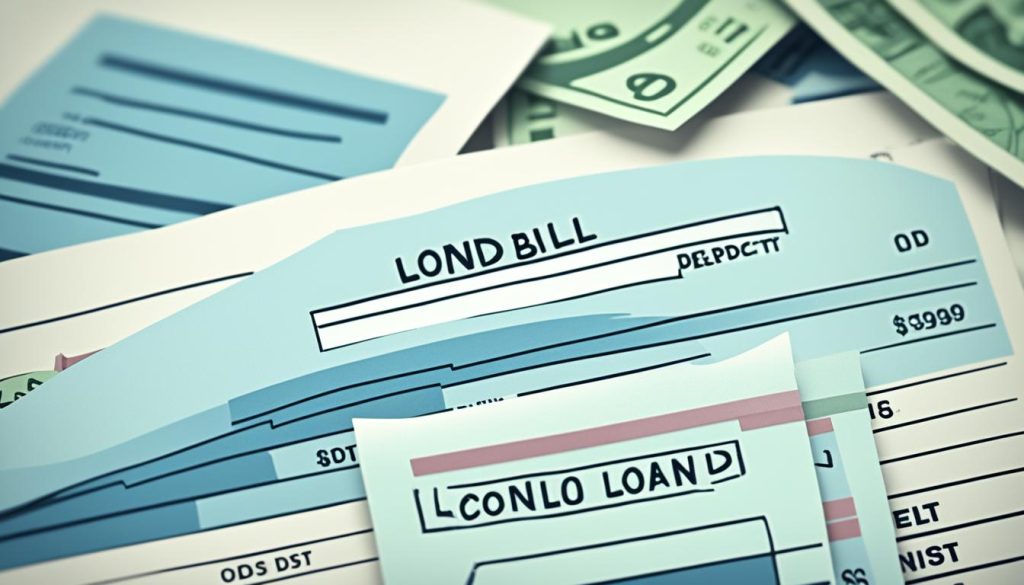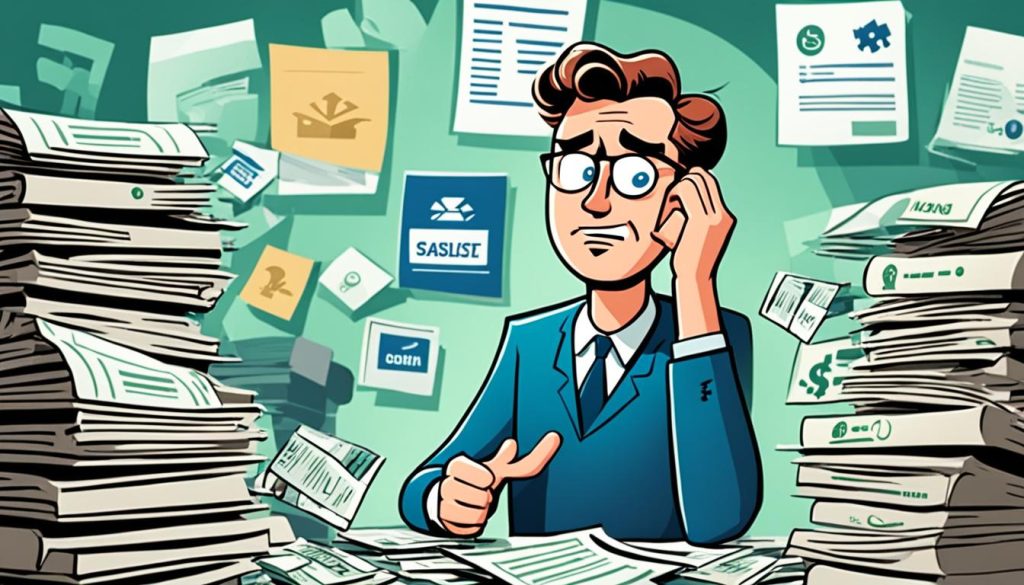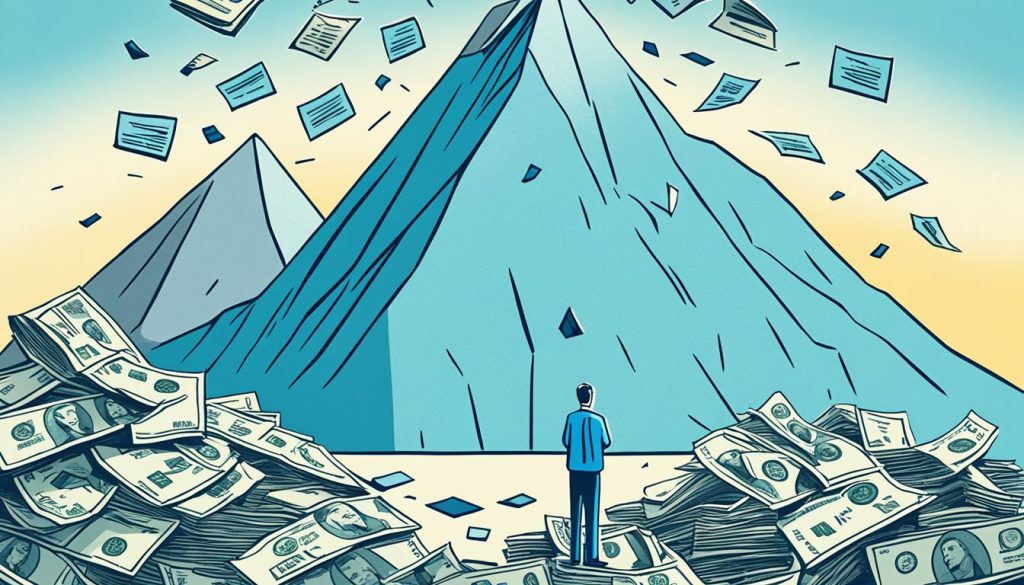Dealing with debt can feel like a heavy burden. Debt consolidation loans might seem like a ray of hope. They could make managing your money easier, lower your interest rates, and even help improve your credit score1. But, it’s important to know the downsides, like upfront fees and the chance of paying more interest over time1.
Whether debt consolidation is right for you depends on your financial situation and goals. If you have a good credit score, want to make payments simpler, and can handle the monthly payments, it might be a good choice1. But, if your credit score is low or you’re not sure about making regular payments, the risks might be too high.
Key Takeaways
- Debt consolidation can simplify your finances and potentially lower your interest rates
- Upfront costs and extending the repayment period could result in higher overall interest payments
- Your credit score plays a crucial role in determining the interest rate and terms of a debt consolidation loan
- Careful budgeting and consistent payments are essential to ensuring the success of a debt consolidation strategy
- Addressing the underlying causes of your debt is crucial to preventing further accumulation
Understanding Debt Consolidation
What Is Debt Consolidation?
Debt consolidation is a strategy that combines several debts into one loan2. This can make your monthly payments easier to manage, possibly lower your interest rates, and help you pay off debt faster2. It’s important to know the process and consider the pros and cons before deciding if it’s right for you.
To consolidate debt, you take out a new loan, like a personal loan or a balance transfer credit card2. This can lower your monthly payments and reduce the interest you pay each month2. It can also help catch up on past-due accounts, which can improve your credit score2.
But, debt consolidation isn’t for everyone2. You might face upfront fees, like origination or balance transfer fees, and risk losing assets if you can’t pay back a secured loan2. Your credit score affects the interest rates and fees you’ll get, and poor credit can lead to higher costs2. Also, having more credit available can tempt you to spend more if you don’t change your spending habits2.
Deciding on debt consolidation depends on your financial goals, budget, and credit score2. Talking to a financial advisor can help you make a choice that’s good for your financial future2.
For comparing debt consolidation loans, tools like Experian CreditMatch™ are useful2. They let you look at different offers with a soft credit check, saving time and making it easier to compare them2.
Debt Consolidation Loans: Pros and Cons:
Debt consolidation is a way to manage many debts with one loan. It can save you money on interest, make managing money easier, and even boost your credit score3. To consolidate debt, you get a new loan, use it to clear your old debts, and then pay back the new loan3.
There are several ways to consolidate debt, like balance transfer credit cards, personal loans, and home equity loans or HELOCs4. Balance transfer cards might have a 0% introductory APR, while personal loans are about 15% and home equity loans around 7%3. It’s key to look at the terms and fees of each option to find the best deal for you.
One big plus of debt consolidation is getting a lower interest rate than what you’re paying now5. This can cut down on interest charges and help you pay off debt quicker5. It also makes managing money easier by turning several payments into one each month4.
But, debt consolidation has its downsides3. Closing credit accounts can hurt your credit score, and longer payback periods might mean paying more by the end3. Loans for those with poor credit can have APRs up to 35.99%, greatly increasing what you pay back3.
To get a debt consolidation loan, you usually need a steady income and a good credit score3. A high credit use ratio can also affect your chances3. Think carefully about the good and bad of debt consolidation to see if it’s right for your financial goals.
In summary, debt consolidation means combining several debts into one, usually at a lower interest rate, to make paying back easier and save money4. The steps include getting a new loan, using it to clear your old debts, and then paying back the new loan3. While it has many benefits, make sure it’s the best choice for your financial situation5.
Debt Consolidation Loans: Pros and Cons
Debt consolidation can be a powerful tool for managing multiple debts. It’s important to weigh the benefits and drawbacks before deciding. If you’re dealing with credit card debt, medical bills, or other debts, knowing the pros and cons of debt consolidation loans can help you decide if it’s right for you.
Potential Benefits of Debt Consolidation
One big advantage of debt consolidation is getting a lower interest rate6. Personal loans often have lower rates for people with good credit, which can lower your debt’s cost7. Also, having just one monthly payment can make managing your money easier and help you stick to your repayment plan6.
Debt consolidation might also improve your credit score7. By lowering your credit use and paying on time, it can positively affect your credit history. This could lead to a higher credit score7.
Potential Drawbacks of Debt Consolidation
Debt consolidation has its downsides too. One big concern is the risk of higher interest rates3. Some personal loans for debt consolidation can have APRs up to 35.99%, especially for those with bad credit scores3.
There may also be upfront costs like origination fees or closing costs, which could offset savings73. Make sure to check the loan’s terms and conditions to ensure it’s cheaper than your current debts.
Another issue is the chance of getting into new debt after consolidation7. If you don’t fix the financial issues that caused your debt, you might end up in debt again7. It’s key to stay disciplined and avoid new debt for debt consolidation to work.
Deciding to consolidate your debt should be based on a detailed look at your finances, goals, and commitment to a repayment plan6. Talking to a financial advisor can help you see if debt consolidation is the best choice for you and guide you in making a smart decision6.

When Should You Consolidate Your Debt?
Debt consolidation can be a smart move, but it depends on your situation7. You should think about your debt amount, credit score, and financial goals8.
If you’re struggling with high-interest credit card debt, consider consolidating9. Consolidation loans usually have lower interest rates than credit cards, saving you money7. It also simplifies your payments into one easy monthly sum9.
But, if you can pay off your debt in a year or less, consolidation might not be the best choice7. The fees and credit checks for a new loan might not be worth it9. You should also work on changing your spending habits that led to debt8.
Think about your credit score, debt amount, and loan repayment ability before deciding8. Consider how committed you are to paying off debt and fix any spending issues7. By weighing these factors, you can decide if consolidation is right for you8.
“Debt consolidation can be a powerful tool, but it’s not a one-size-fits-all solution. It’s essential to carefully evaluate your financial situation and determine if it’s the right choice for you.”
Obtaining a Debt Consolidation Loan
Steps to Get a Debt Consolidation Loan
Getting a personal loan to consolidate your debts can make paying back easier and might save you money on interest. To get a debt consolidation loan, first, figure out your financial situation. Then, look for lenders and apply6.
- Look at your debt: Add up all your debts, like credit card balances and loans. See how much you make each month and what you spend. This helps you understand your debt-to-income ratio6.
- Check your credit score: Your credit score affects the loan’s interest rate and terms. Check your credit report and improve your score if it’s low1.
- Find lenders: Look at banks, credit unions, and online lenders that offer debt consolidation loans. Compare their rates, fees, and repayment plans to find the best one for you1.
- Get your documents ready: You’ll need things like your ID, proof of income, and a list of debts. These are needed when you apply for the loan6.
- Apply for the loan: You can apply online or in person. Be ready to talk about your finances and why you need the loan6.
- Look over and accept the loan terms: After approval, check the loan details, like the interest rate and repayment plan. If it’s okay, accept the loan and use it to pay off your debts1.
For a debt consolidation loan to work, make sure your monthly payments are easy to handle. Stick to making payments on time61.

Remember, consolidating debt doesn’t mean you’re debt-free. You need to manage your money well and stay disciplined for it to work long-term6.
Managing Your Debt Consolidation Loan
Getting a debt consolidation loan is just the start to financial freedom. The hard part is managing your debt consolidation loan well to get the most out of it. Here are some key tips to help you manage your loan effectively:
- Make timely payments: Always pay your monthly bills on time to avoid extra fees and harm to your credit score7.
- Set up automatic payments: Using automatic payments helps prevent missing or late payments7.
- Avoid new debt: Don’t take on more debt to keep your progress with debt consolidation7.
- Monitor your credit: Watch your credit report and score to see how your loan affects your finances1.
- Communicate with your lender: If you’re having trouble paying, talk to your lender quickly to find solutions and avoid missing payments7.
It’s important to make payments on your debt consolidation loan and keep track of it. By doing so, you can make the most of this financial strategy. These tips will help your loan work for you and help you reach your financial goals.
| Lender | NerdWallet Rating | APR Range | Loan Amount |
|---|---|---|---|
| NerdWallet | 5.0 | 8.99% – 29.99% | $5,000 – $100,000 |
| NerdWallet | 4.0 | 9.95% – 35.99% | $2,000 – $35,000 |
| Best Egg | 4.5 | 8.99% – 35.99% | $2,000 – $50,000 |
| LightStream | 4.5 | 6.99% – 25.49% | $5,000 – $100,000 |
The table shows the many options for managing debt consolidation loans. Lenders offer different APR rates and loan amounts for various needs10.
“By consolidating $9,000 of debt with a combined APR of 25% into a loan with a 17% APR and a two-year term, you can save $820 in interest and reduce your monthly payment from $500 to $445.”10
This example shows how managing your debt consolidation loan can save you money and make payments easier10.
It’s key to keep up with your debt consolidation loan to get the most benefits and avoid problems. By following these tips, your loan can be a powerful tool for financial stability and growth.
Conclusion
This guide has shown how debt consolidation can help simplify your finances and save you money on interest. But, it’s important to think carefully about it. You need to weigh the good and bad sides to see if it fits your financial situation11.
Debt consolidation can make your monthly payments easier, lower interest rates, and give you a clear repayment plan1. But, it’s key to fix the problems that caused the debt in the first place. Debt consolidation is just a step towards getting back on track. You must also build good financial habits and a plan for managing debt long-term.
Whether you decide to consolidate your debt or look into other ways to manage it, being proactive is key. Make smart choices and keep your spending and repayment habits in check. This way, you can manage your money better and aim for a future without debt12.
FAQ
What is debt consolidation and how does it work?
Debt consolidation means you combine several debts into one loan. This can help you save money on interest and make managing your money easier by having just one payment each month.
What types of debt can I consolidate?
You can consolidate almost any kind of consumer debt. This includes medical bills, personal loans, credit card debt, and student loans.
What are the potential benefits of debt consolidation?
Consolidating debt can lead to lower interest rates and faster debt repayment. It simplifies your finances by giving you one payment to track. You also get a fixed repayment plan, which can help your credit score.
What are the potential drawbacks of debt consolidation?
Debt consolidation might come with upfront costs and a higher interest rate. It could mean paying more interest over time. There’s also a risk of missing payments and not addressing the root financial issues.
When is debt consolidation a good idea?
It’s a smart move if you have a lot of debt and want to improve your finances. You should also have a good enough credit score to get a lower interest rate.
How do I get a debt consolidation loan?
To get a debt consolidation loan, you use the loan to pay off your current debts. Some lenders offer special debt consolidation loans. Others let you use regular personal loans for this purpose.
How do I manage a debt consolidation loan responsibly?
Managing your debt consolidation loan well means paying on time and in full each month. Avoid new debt and set up automatic payments to prevent missing payments.
Source Links
- Pros and Cons of Debt Consolidation | Bankrate
- Pros and Cons of Debt Consolidation – Experian
- Pros & Cons of Debt Consolidation
- What Are the Pros and Cons of Debt Consolidation? (2024 Guide)
- The Pros and Cons of Debt Consolidation
- Consolidating debts: Pros and cons to keep in mind
- Pros and Cons of Debt Consolidation: Is It the Right Choice for You?
- What Is Debt Consolidation, and Should I Consolidate? – NerdWallet
- Thinking of consolidating your debt? Here are four signs it could be the right move for you
- The Pros and Cons of Debt Consolidation – NerdWallet
- Pros & Cons of Debt Consolidation: Is It Worth It?
- Articles

